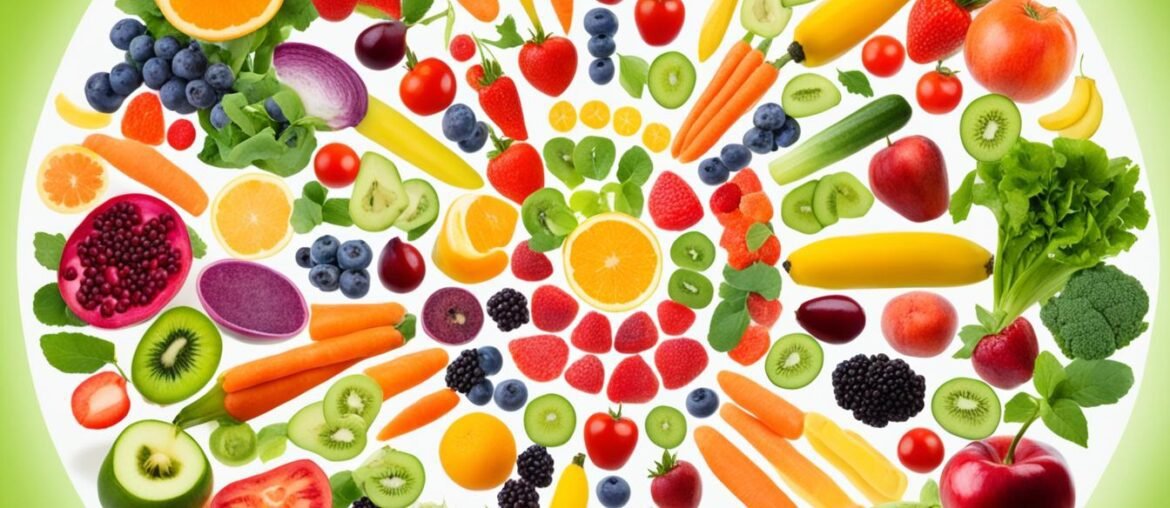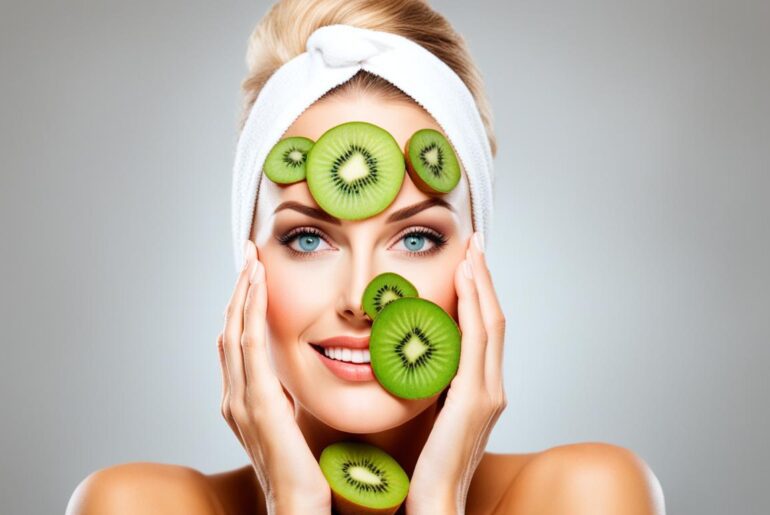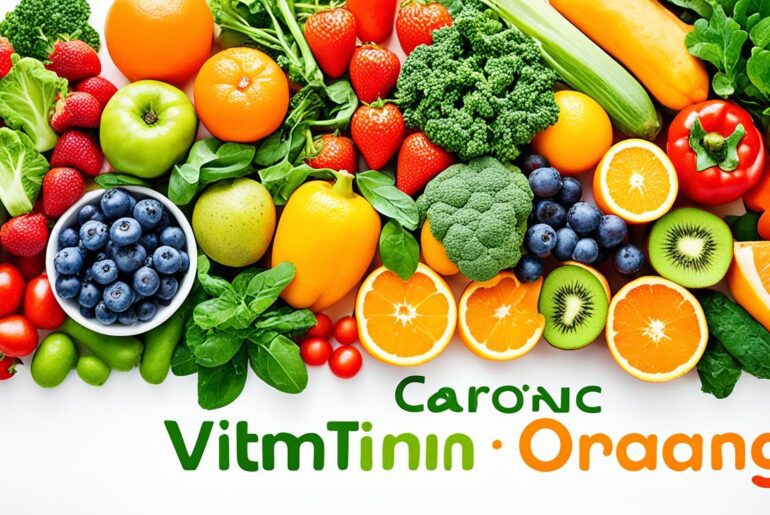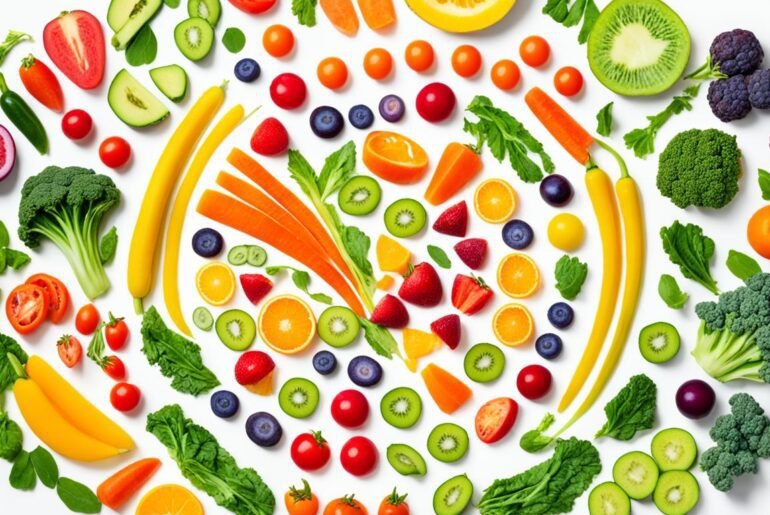Have you ever wondered if there are vitamins that can actually help combat aging skin? Many of us invest in various skincare products containing vitamins, hoping to achieve youthful and radiant skin. But do these vitamins really make a difference?
In this article, I will discuss the skin benefits of vitamins and reveal the three key antioxidants that have been proven to prevent and reverse skin damage. Prepare to be surprised as we delve into the truth about antiaging vitamins.
Key Takeaways:
- Vitamins such as selenium, vitamin E, and vitamin C have been proven to decrease the effect of the sun on the skin and prevent further damage.
- Selenium helps protect the body from skin cancer caused by sun exposure.
- Vitamin E protects cell membranes and prevents damage to enzymes associated with them.
- Vitamin C is the most common antioxidant found in the skin and is important for repairing free radicals and preventing them from becoming cancerous or accelerating the aging process.
- Including these vitamins in your diet or using skincare products that contain them can help enhance your skin’s youthful glow and reduce the appearance of wrinkles.
The Importance of Antioxidants for Healthy Skin
Antioxidants play a crucial role in maintaining healthy, youthful skin. They protect the skin from damage caused by free radicals, which are produced by normal body processes and environmental factors like smoking and UV radiation. By neutralizing these free radicals, antioxidants help prevent premature aging of the skin and reduce the risk of skin cancer.
Vitamins such as E and C are powerful antioxidants that can be beneficial for the skin when applied topically or taken as supplements.
When applied topically, vitamin E provides antioxidant skin benefits by protecting cell membranes and preventing damage to enzymes associated with them. This helps maintain the overall health and integrity of the skin. On the other hand, vitamin C is the most common antioxidant found in the skin and is important for repairing free radicals and preventing them from becoming cancerous or accelerating the aging process.
Taking vitamin E and vitamin C supplements can also support healthy skin from within. These antioxidants help boost the body’s natural defenses against free radicals, promoting a youthful and radiant complexion.
To further understand the importance of antioxidants for skin health, let’s take a closer look at their various benefits:
- Protection against premature aging: Antioxidants help counteract the damaging effects of free radicals, which can lead to premature aging. This includes the appearance of fine lines, wrinkles, and age spots.
- Reduction of inflammation: Inflammation is a common cause of skin concerns like acne, rosacea, and eczema. Antioxidants have anti-inflammatory properties that can help soothe and calm the skin.
- Promotion of collagen production: Collagen is a protein that provides structure and elasticity to the skin. Antioxidants, particularly vitamin C, can stimulate collagen synthesis, keeping the skin firm and supple.
- Enhancement of skin barrier function: Antioxidants support the skin’s protective barrier, which acts as a shield against environmental aggressors. A healthy skin barrier helps maintain moisture and prevents the entry of harmful substances.
By incorporating antioxidant-rich skincare products and a diet rich in fruits, vegetables, and whole grains, you can harness the power of antioxidants to promote healthy, glowing skin.
Image:
Selenium for Skin Protection

Selenium is a mineral that plays a crucial role in protecting the skin from various forms of cancer, including skin cancer caused by sun exposure. In addition to its cancer-fighting properties, selenium also helps preserve tissue elasticity and slows down the aging process of the skin.
A recent study conducted with animals has revealed the potential benefits of selenium in shielding the skin from the harmful effects of UV radiation. Whether taken orally or applied topically, selenium has shown promising results in providing protection against UV damage. Moreover, it has been found to delay the development of skin cancer.
If you’re looking to incorporate selenium into your diet, there are several natural sources you can consider. Whole grain cereals, seafood, garlic, and eggs are all excellent dietary sources of selenium.
The Benefits of Selenium for the Skin:
- Offers protection against skin cancer caused by sun exposure.
- Preserves tissue elasticity and slows down the aging process.
- Provides defense against UV damage.
- Delays the development of skin cancer.
By including selenium-rich foods in your diet and considering selenium supplementation, you can harness the skin-protective benefits of this essential mineral.
Image: Selenium is a key mineral that can help protect the skin from harmful UV radiation and prevent skin cancer.
Vitamin E for Skin Health
Vitamin E is considered the most important antioxidant for skin health. It protects cell membranes and prevents damage to enzymes associated with them. Studies have shown that applying vitamin E to the skin can reduce damage caused by sun exposure and limit the production of cancer-causing cells. It is also important to include vitamin E in your diet through sources like vegetable oils, grains, oats, nuts, and dairy products.
The Benefits of Vitamin E for Your Skin
Vitamin E has numerous benefits for maintaining healthy and youthful skin:
- Prevents skin damage: Vitamin E helps protect your skin from harmful UV rays and reduces the risk of sunburn and skin cancer.
- Moisturizes dry skin: It acts as a natural moisturizer, keeping your skin hydrated and preventing dryness.
- Reduces inflammation: Vitamin E has anti-inflammatory properties that can calm irritated and inflamed skin.
- Improves skin elasticity: It promotes the production of collagen, a protein that maintains the skin’s elasticity and firmness.
- Minimizes the appearance of scars: Vitamin E can help fade scars and improve the overall texture of your skin.
Whether you choose to apply vitamin E topically or incorporate it into your diet, it is important to reap its benefits for healthy skin.
“Vitamin E protects cell membranes and prevents damage to enzymes associated with them.”
Getting Vitamin E from Natural Sources
To ensure an adequate intake of vitamin E, incorporate the following sources into your diet:
| Food Source | Vitamin E Content (per serving) |
|---|---|
| Vegetable oils (such as sunflower, safflower, and wheat germ oil) | 6-15mg |
| Grains (such as wheat germ and oatmeal) | 4-10mg |
| Nuts and seeds (such as almonds, peanuts, and sunflower seeds) | 2-7mg |
| Dairy products (such as yogurt and cheese) | 1-2mg |
Remember to consult with a dermatologist or healthcare professional before making any significant changes to your skincare routine or diet.
Vitamin C for Youthful Skin

Vitamin C is an essential nutrient that provides numerous benefits for achieving and maintaining youthful skin. It is not only a powerful antioxidant but also plays a crucial role in collagen synthesis, which is necessary for the structure and elasticity of the skin. By incorporating vitamin C into your skincare routine and diet, you can rejuvenate your skin and protect it from environmental stressors.
One of the key skin benefits of vitamin C is its ability to repair free radical damage and prevent them from becoming cancerous. Free radicals are unstable molecules that can cause cellular damage and contribute to premature aging of the skin. Vitamin C neutralizes these free radicals, protecting your skin from oxidative stress and reducing the appearance of wrinkles, fine lines, and age spots.
The skin is particularly vulnerable to environmental stressors that deplete vitamin C levels, such as sun exposure and pollution. Studies have shown that even minimal UV exposure can decrease vitamin C levels in the skin by 30 percent, leading to skin damage and accelerated aging. To counteract this, it is essential to include vitamin C-rich foods in your diet and use skincare products formulated with vitamin C.
Some excellent sources of vitamin C include citrus fruits like oranges, lemons, and grapefruits, as well as vegetables such as broccoli, peppers, and Brussels sprouts. By consuming these vitamin C-rich foods regularly, you can boost your skin’s vitamin C levels and promote skin rejuvenation.
Benefits of Vitamin C for Skin Rejuvenation:
- Reduces the appearance of wrinkles and fine lines
- Improves skin texture and tone
- Brightens and enhances skin radiance
- Protects against UV damage and environmental pollutants
- Boosts collagen production for firmer, more youthful-looking skin
In addition to consuming vitamin C-rich foods, you can also incorporate topical vitamin C serums and creams into your skincare routine for maximum benefits. These formulations deliver vitamin C directly to the skin, helping to improve skin tone, reduce hyperpigmentation, and enhance overall skin radiance.
Using vitamin C in your skincare routine can help protect and revitalize your skin, providing a youthful and radiant complexion.
| Vitamin C Sources | Vitamin C Content (per 100g) |
|---|---|
| Oranges | 53.2mg |
| Red bell peppers | 128mg |
| Kiwi | 92.7mg |
| Strawberries | 58.8mg |
| Papaya | 60.9mg |
| Pineapple | 47.8mg |
Remember, consistency is key when it comes to reaping the skin benefits of vitamin C. Incorporate this powerful antioxidant into your daily skincare routine and diet to nourish your skin from within and achieve a youthful, glowing complexion.
Curcumin – The Power of Turmeric
Curcumin, the main active compound found in turmeric, offers a wide range of skin benefits. Its powerful cellular protective properties make it a valuable ingredient for promoting skin health and longevity.
Curcumin activates proteins that help delay cellular senescence, the process of aging at the cellular level. By doing so, it supports the overall health and function of skin cells, promoting a youthful appearance.
“Curcumin not only combats cellular damage but also has been shown to increase lifespan in animal studies.”
Animal studies have demonstrated that curcumin plays a vital role in combating cellular damage, leading to potential anti-aging effects. The ability of curcumin to protect cells from oxidative stress and DNA damage contributes to its longevity-enhancing properties.
Additionally, turmeric intake has been associated with a reduced risk of age-related cognitive decline. The potent antioxidant properties of curcumin help protect brain cells from damage, supporting cognitive function and overall brain health.
To experience the benefits of curcumin, it can be incorporated into your daily routine through various methods:
- Using fresh or dried turmeric in cooking
- Taking curcumin supplements
These methods ensure you are harnessing the power of curcumin and optimizing its skin-boosting effects.
Curcumin Sources
The primary source of curcumin is turmeric, a vibrant yellow spice commonly found in Asian cuisine. Turmeric is derived from the Curcuma longa plant, which is a member of the ginger family.
| Turmeric Source | Description |
|---|---|
| Fresh Turmeric | Whole turmeric roots can be found in the produce section of grocery stores. They can be peeled, grated, or juiced for consumption. |
| Dried Turmeric | Dried turmeric is a convenient option for adding flavor and color to dishes. It is widely available in powder form in the spice aisle. |
| Curcumin Supplements | Curcumin supplements are available in capsule or tablet form. They provide a concentrated dose of curcumin for those seeking targeted benefits. |
Whether consumed as part of your diet or taken as a supplement, curcumin can offer significant skin benefits and support overall well-being.
Green Tea – A Source of EGCG

When it comes to skincare, nature has provided us with a treasure trove of beneficial compounds. One such compound is epigallocatechin gallate (EGCG), a powerful polyphenol found in green tea. This remarkable substance offers a wide range of skin benefits, making green tea an excellent choice for those seeking natural skincare solutions.
EGCG has been shown to improve mitochondrial function within cells, supporting overall cellular health. Additionally, it activates pathways involved in aging, helping to maintain a youthful complexion. Green tea’s EGCG content also induces autophagy, a process by which the body eliminates damaged cellular material, promoting a healthy and vibrant appearance.
One of the most impressive benefits of EGCG is its ability to protect the skin against aging. Regular intake of green tea has been linked to a reduced risk of aging skin, allowing you to maintain a youthful glow for longer. Furthermore, EGCG provides protection against hyperpigmentation caused by UV light, reducing the appearance of dark spots and uneven skin tone.
If you’re looking to incorporate more EGCG into your skincare routine, there are a few options available. One simple way is to increase your consumption of green tea. Enjoying a warm cup of green tea daily can help boost your intake of this skin-healthy compound. If you prefer a more concentrated dose, green tea extract supplements are also available.
Collagen for Skin Structure

Collagen is a vital protein that plays a crucial role in supporting the structure and elasticity of the skin. As we age, collagen production naturally declines, resulting in visible signs of aging such as wrinkles, sagging skin, and dryness. However, collagen supplementation has gained popularity for its potential to promote youthful-looking skin and address age-related skin concerns.
Studies have shown that collagen supplementation can provide significant skin benefits. Clinical trials have demonstrated that regular collagen intake can:
- Reduce the appearance of wrinkles and fine lines
- Improve skin hydration and moisture levels
- Enhance skin elasticity and firmness
- Promote smoother and more youthful-looking skin
Collagen supplements are available in various forms, including powders, capsules, and drinks. These supplements typically contain types I and III collagen, which are the most abundant types found in the skin. When taken orally, collagen peptides are broken down and absorbed into the bloodstream, where they can support collagen synthesis and improve skin health.
Harness the power of collagen supplementation and enjoy its remarkable benefits for your skin. Incorporating collagen supplements into your daily routine can help you maintain a vibrant and youthful complexion, combating the effects of aging.
Collagen Sources
Collagen can be derived from various sources. The most common sources of collagen for supplementation include:
| Collagen Source | Description |
|---|---|
| Bovine Collagen | Derived from cows, bovine collagen is rich in type I and III collagen, making it beneficial for skin health. |
| Marine Collagen | Extracted from fish, marine collagen is a potent source of type I collagen, offering excellent bioavailability. |
| Porcine Collagen | Sourced from pigs, porcine collagen is similar to human collagen and is often used in medical and cosmetic applications. |
When choosing collagen supplements, opt for reputable brands that prioritize quality and sustainability. It’s essential to select supplements that undergo rigorous testing and adhere to strict manufacturing standards.
Remember, collagen supplementation can complement a comprehensive skincare routine and healthy lifestyle practices in promoting optimal skin health and a more youthful appearance.
CoQ10 for Aging Prevention

Coenzyme Q10 (CoQ10) is an antioxidant that plays a crucial role in energy production and protects against cellular damage. As we age, levels of CoQ10 naturally decline, which can lead to various health issues. Supplementing with CoQ10 has been shown to offer numerous benefits, including improved overall quality of life in older adults, reduced physical and mental deterioration, and enhanced heart health.
CoQ10 supplements work by reducing oxidative stress, which is a key factor in accelerating the aging process. By neutralizing free radicals and supporting mitochondrial function, CoQ10 helps maintain optimal cellular health and vitality. This antioxidant not only aids in the prevention of age-related diseases but also supports healthy aging from within.
Benefits of CoQ10 for the Skin
CoQ10 is not only beneficial for internal health but also plays a significant role in maintaining skin health and aging prevention. The antioxidant properties of CoQ10 protect the skin from oxidative damage caused by environmental factors such as UV radiation and pollution. By neutralizing harmful free radicals, CoQ10 helps prevent premature aging of the skin and the formation of wrinkles.
In addition to its antioxidant properties, CoQ10 also supports collagen production, which is essential for maintaining skin elasticity and firmness. Collagen helps keep the skin plump and youthful-looking, reducing the appearance of fine lines and wrinkles.
CoQ10 Sources
CoQ10 can be obtained through supplementation. It is available in various forms, including capsules, tablets, and liquid formulations. When considering CoQ10 supplementation, it is advisable to consult with a healthcare professional to determine the appropriate dosage and ensure it is suitable for your individual needs.
Note: It is important to choose high-quality CoQ10 supplements from reputable brands to ensure their efficacy and safety.
Summary
CoQ10 offers a range of benefits for aging prevention and overall health. It acts as a powerful antioxidant, protecting against cellular damage and supporting healthy aging. Additionally, CoQ10 promotes skin health by preventing oxidative damage, reducing the appearance of wrinkles, and supporting collagen production. As always, consult with a healthcare professional before starting any new supplementation regimen.
Conclusion
In conclusion, the role of vitamins and antioxidants in maintaining healthy, youthful skin cannot be overstated. Selenium, vitamin E, and vitamin C are powerful antioxidants that have been proven to protect the skin from damage and prevent the signs of aging. Including these vitamins in your diet or incorporating skincare products that contain them can significantly enhance your skin’s youthful glow and minimize the appearance of wrinkles.
Moreover, other supplements like curcumin, EGCG, collagen, and CoQ10 also show promise in supporting healthy aging and preventing age-related skin issues. These supplements have been found to possess beneficial properties that contribute to the overall health and rejuvenation of the skin.
Before starting any new supplement regimen, it is important to consult with a dermatologist or healthcare professional. They can provide guidance tailored to your specific needs and ensure that you are making informed choices when it comes to your skincare routine.
FAQ
Are all face creams containing vitamins effective in preventing or reversing skin damage?
No, not all face creams containing vitamins are effective in preventing or reversing skin damage. Dermatologists recommend antioxidants like selenium, vitamin E, and vitamin C to decrease the effects of the sun on the skin and prevent further damage.
What role do antioxidants play in maintaining healthy, youthful skin?
Antioxidants play a crucial role in maintaining healthy, youthful skin. They protect the skin from damage caused by free radicals, which are produced by normal body processes and environmental factors. By neutralizing these free radicals, antioxidants help prevent premature aging and reduce the risk of skin cancer.
How does selenium protect the skin?
Selenium helps protect the body from skin cancer caused by sun exposure. It also preserves tissue elasticity and slows down the aging process. Selenium can be obtained from dietary sources such as whole grain cereals, seafood, garlic, and eggs.
What benefits does vitamin E provide for the skin?
Vitamin E is considered the most important antioxidant for skin health. It protects cell membranes and prevents damage to enzymes associated with them. Applying vitamin E to the skin can reduce damage caused by sun exposure and limit the production of cancer-causing cells. Vitamin E can be found in vegetable oils, grains, oats, nuts, and dairy products.
How does vitamin C contribute to youthful skin?
Vitamin C is the most common antioxidant found in the skin and is essential for repairing free radicals and preventing them from becoming cancerous. It is particularly susceptible to depletion due to environmental stressors like sun exposure and pollution. Including vitamin C-rich foods like vegetables and citrus fruits in your diet can help boost your skin’s vitamin C levels.
What are the skin benefits of curcumin?
Curcumin, the main active compound in turmeric, possesses powerful cellular protective properties. It activates proteins that help delay cellular senescence and promote longevity. Curcumin also combats cellular damage and increases lifespan. It can be obtained by using fresh or dried turmeric in cooking or through curcumin supplements.
What is the significance of EGCG in green tea?
Epigallocatechin gallate (EGCG) is a powerful polyphenol concentrated in green tea. It improves mitochondrial function in cells and activates pathways involved in aging. EGCG also induces autophagy, the process by which the body removes damaged cellular material. Drinking green tea or taking green tea extract supplements can increase your intake of EGCG.
How does collagen benefit the skin?
Collagen is a protein that helps maintain skin structure. As we age, collagen production slows down, leading to signs of aging like wrinkles. Supplementing with collagen has been shown to reduce signs of aging, including wrinkles and dry skin. Collagen can be obtained through various supplements available in forms like powders and capsules.
What is the role of CoQ10 in aging prevention?
Coenzyme Q10 (CoQ10) is an antioxidant that plays an essential role in energy production and protects against cellular damage. Supplementing with CoQ10 has been shown to improve overall quality of life in older adults, reduce physical and mental deterioration, and benefit heart health. CoQ10 supplements can reduce oxidative stress, which accelerates the aging process.
What are the key takeaways regarding vitamins for antiaging skin benefits?
Vitamins and antioxidants, such as selenium, vitamin E, and vitamin C, play a crucial role in maintaining healthy, youthful skin. Including these vitamins in your diet or using skincare products that contain them can help enhance your skin’s youthful glow and reduce the appearance of wrinkles. Other supplements like curcumin, EGCG, collagen, and CoQ10 also show potential in supporting healthy aging and preventing age-related skin issues.




